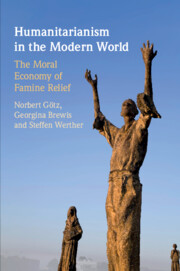Acknowledgements
This book is the result of a research project entitled ‘The Moral Economy of Global Civil Society: A History of Voluntary Food Aid’ conducted from 2013 to 2019. The study was an international partnership between scholars based at the Institute of Contemporary History, Södertörn University, Stockholm, and the UCL Institute of Education, University College London. We thank our respective institutions and extend our gratitude to the project’s funders, the Swedish Research Council, for enabling this fruitful collaboration under grant no. 2012-614.
Our particular thanks go to those who, in various ways, have been affiliated with the project. Katarina Friberg was one of the original team members and contributed significantly in bringing the project to focus on economic and other practices of humanitarianism, and on rethinking the concept of moral economy. Francesco Zavatti and Julia Lindström have published detailed studies of Italian relief efforts during the Great Irish Famine and on Swedish fundraising for the famine in Somalia 2011–12 that have informed our work. Franziska Kols briefly served as a research assistant. Teddy Primack has provided help with the editing of the manuscript.
We would also like to thank all those who participated in our international workshops and conference sessions for their contributions. Our research benefitted greatly from the insights of many scholars, especially Maria Framke, Daniel Laqua, Andrew Newby, and Pamala Wiepking. Dominique Marshall and Bertrand Taithe, who commented on early drafts of this manuscript, deserve particular mention and special thanks for their inspiring critique and invaluable advice on the book’s proposed structure.
We are also greatly indebted to the many archivists and librarians around the world who made our research possible, as well as two anonymous readers for Cambridge University Press for their rigorous comments. We thank the Foundation for Baltic and East European Studies, Södertörn University’s Publication Committee, University College London, and Roma Tre University for additional financial aid in the research, writing, and publication stages.
Our deepest and warmest thanks go to our families. They have supported us with patience and love through the frequent travels for research and the countless hours of writing over the past six years: Alexandra, Alma, Felix, Hattie, Iain, Joella, Linus, Lorena, Philine, and Toby, can you believe it – it’s done!

